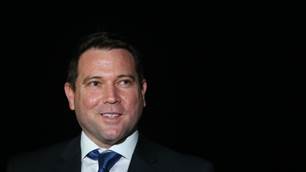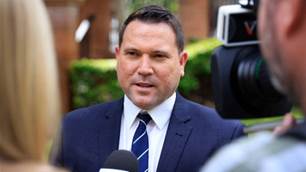EVEN before his high-profile resignation, Lord Triesman was no stranger to controversy.
During his two-year stint at the Football Association, he took on the might of the Premier League and faced resignations by two chief executives.
But when the Spurs fan entered the complex world of football there were hopes he could put his political experience to good use.
The former student radical, who used to belong to the Communist Party, became a Labour minister and peer before taking on his role at the helm of the FA.
Combining a passion for football with a willingness to stand up and be counted, he was seen as the man who could provide decisive leadership which the sport needed as it emerged from a series of scandals.
Colleagues hailed his appointment as the FA's first independent chairman in January 2008.
Chief executive Brian Barwick - who left his post seven months later - said: "His experience on politics, business and sport, allied with his knowledge and passion for the game will be of enormous value to the organisation."
Lord Triesman, 66, quickly set to work on the organisation's four-year vision to develop the sport in England and ensure its future success.
But within months, he clashed with the Premier League by criticising club debts.
Speaking at the Leaders in Football conference at Stamford Bridge in October 2008, he revealed the game was £3billion in the red and needed a radical review to stop it spiralling out of control.
Richard Scudamore, Premier League chief executive, defended clubs' financial affairs and hit back at the FA, accusing it of being "one of the most indebted organisations in the world".
Further strain was placed on the FA's relationship with the Premier League a month later when Lord Triesman called on England's top flight to hand over more cash to the rest of the game and for a ban on transfers of players under 18.
Born on October 30, 1943 in Tottenham, north London, near his beloved Tottenham Hotspur's White Hart Lane ground, David Maxim Triesman began his political career as a teenager when he joined the Labour Party in 1960.
A decade later the left-winger resigned from the party and joined the Communist Party, remaining a member until 1977 when he went back to his Labour roots.
Educated at Stationers' Company's School, he went on to the University of Essex before gaining an MA in philosophy from King's College, Cambridge.
Lord Triesman, who married Lucy Hooberman in 2004, embarked on a career in higher education and went on to rise through union ranks to become General Secretary of the AUT lecturers' union from 1993 to 2001.
He entered the House of Lords in 2004 and was appointed a government whip the same year.
He occupied ministerial positions in the Foreign Office and Department for Innovation, Universities and Skills.
But Lord Triesman, an ex-referee and patron of Tottenham's charitable foundation, stepped down from the DIUS when he was named FA chairman.
He later changed his status in the House of Lords to that of a crossbench peer because he said he wanted England's 2018 World Cup bid to be "wholly outside any party politics".
In the end, however, it was not his politics which doomed the Lord Triesman experiment at the FA to failure.
But when the Spurs fan entered the complex world of football there were hopes he could put his political experience to good use.
The former student radical, who used to belong to the Communist Party, became a Labour minister and peer before taking on his role at the helm of the FA.
Combining a passion for football with a willingness to stand up and be counted, he was seen as the man who could provide decisive leadership which the sport needed as it emerged from a series of scandals.
Colleagues hailed his appointment as the FA's first independent chairman in January 2008.
Chief executive Brian Barwick - who left his post seven months later - said: "His experience on politics, business and sport, allied with his knowledge and passion for the game will be of enormous value to the organisation."
Lord Triesman, 66, quickly set to work on the organisation's four-year vision to develop the sport in England and ensure its future success.
But within months, he clashed with the Premier League by criticising club debts.
Speaking at the Leaders in Football conference at Stamford Bridge in October 2008, he revealed the game was £3billion in the red and needed a radical review to stop it spiralling out of control.
Richard Scudamore, Premier League chief executive, defended clubs' financial affairs and hit back at the FA, accusing it of being "one of the most indebted organisations in the world".
Further strain was placed on the FA's relationship with the Premier League a month later when Lord Triesman called on England's top flight to hand over more cash to the rest of the game and for a ban on transfers of players under 18.
Born on October 30, 1943 in Tottenham, north London, near his beloved Tottenham Hotspur's White Hart Lane ground, David Maxim Triesman began his political career as a teenager when he joined the Labour Party in 1960.
A decade later the left-winger resigned from the party and joined the Communist Party, remaining a member until 1977 when he went back to his Labour roots.
Educated at Stationers' Company's School, he went on to the University of Essex before gaining an MA in philosophy from King's College, Cambridge.
Lord Triesman, who married Lucy Hooberman in 2004, embarked on a career in higher education and went on to rise through union ranks to become General Secretary of the AUT lecturers' union from 1993 to 2001.
He entered the House of Lords in 2004 and was appointed a government whip the same year.
He occupied ministerial positions in the Foreign Office and Department for Innovation, Universities and Skills.
But Lord Triesman, an ex-referee and patron of Tottenham's charitable foundation, stepped down from the DIUS when he was named FA chairman.
He later changed his status in the House of Lords to that of a crossbench peer because he said he wanted England's 2018 World Cup bid to be "wholly outside any party politics".
In the end, however, it was not his politics which doomed the Lord Triesman experiment at the FA to failure.
Copyright (c) Press Association
Related Articles

James Johnson was cruelly denied a World Cup. He believes Graham Arnold will repay that debt

FA boss expects Socceroos to play in Sydney in front of vaccinated crowds













